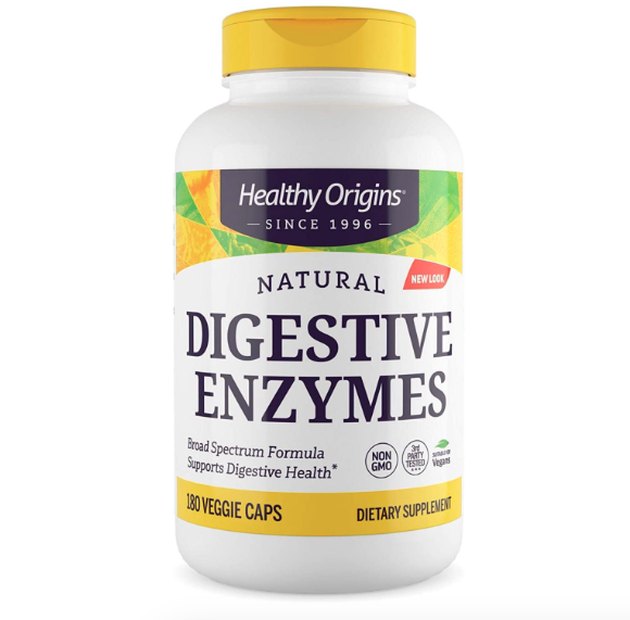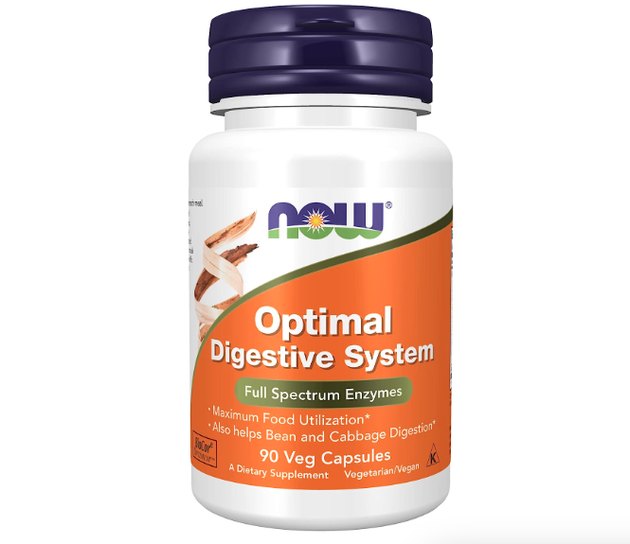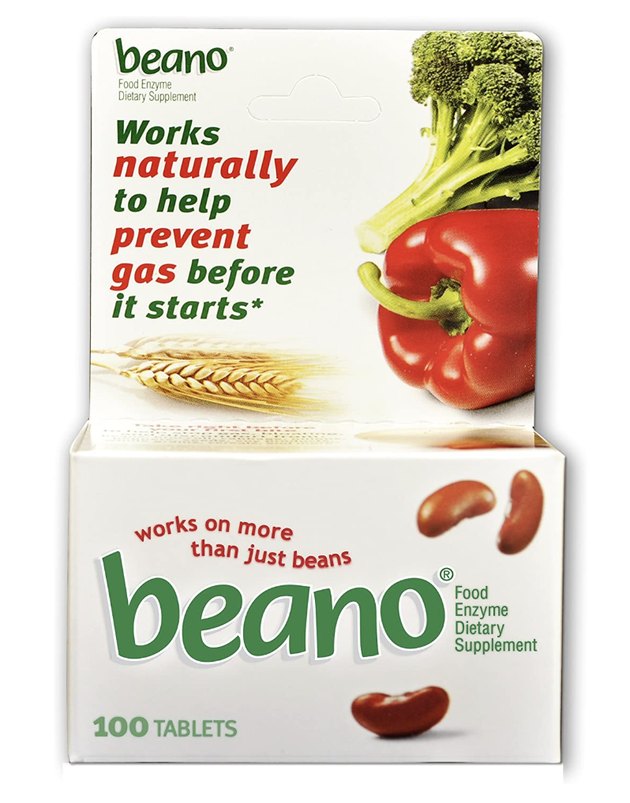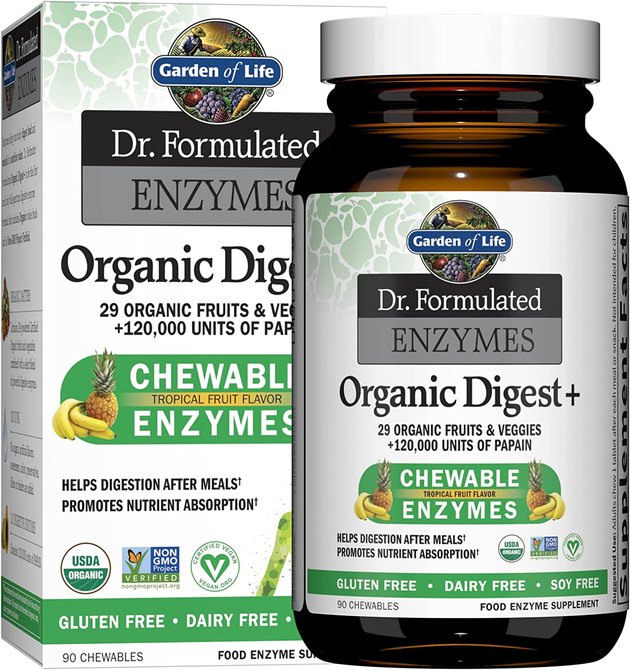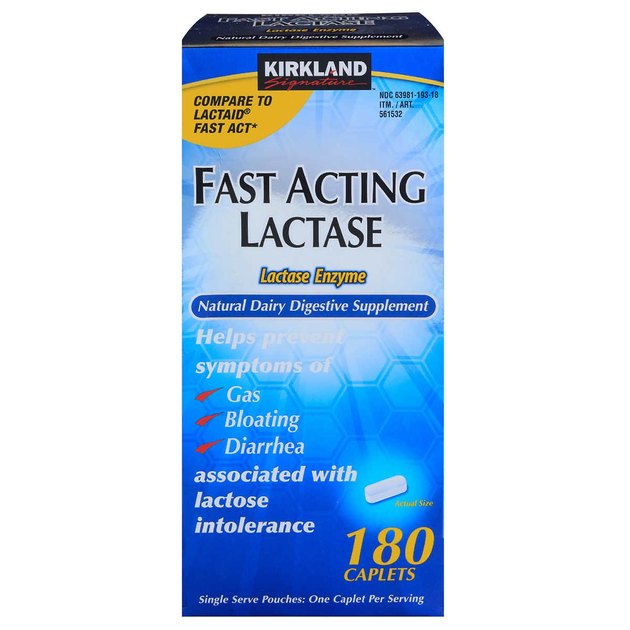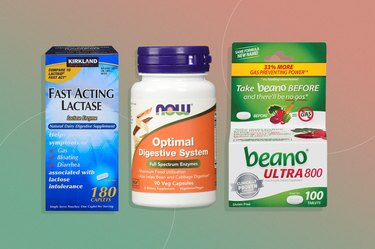
You'd probably never put much thought into your digestive enzymes — that is, the molecules in your gut that help break down your food — unless they're not working so well. If you're not able to break down food properly, though, your body can't absorb it, which can lead to health issues.
That's where digestive enzyme supplements come in. For some people, these supplements may help the body break down certain foods that it has trouble with, easing digestive symptoms and helping them better absorb nutrients.
Video of the Day
Video of the Day
But these products aren't for everyone.
Here's a look at who would benefit from these enzymes, what to look for in a supplement and the best products to buy based on your needs and budget.
The Best Digestive Enzyme Supplements
- Best Overall: Healthy Origins Digestive Enzymes ($34.99; Amazon)
- Best on a Budget: NOW Optimal Digestive System ($12.71; Amazon)
- Best for IBS: Beano ($11.05; Amazon)
- Best Vegan: Garden of Life Organic Chewable Enzyme Supplement ($33.99; Amazon)
- Best for Lactose Intolerance: Kirkland Fast Acting Lactase (from $23.47; Amazon)
How We Chose
To select the best digestive enzymes, we made sure to follow the existing research about when and how digestive enzymes can help. (More on that in a moment.) We looked for products that fit the following criteria:
- From reputable brands, with third-party testing
- Budget-friendly
- Effective
Learn more about how we cover products.
Who Needs Digestive Enzymes?
As tempting as it is to self-diagnose with a simple internet search, it's always a good idea to get your doctor's opinion before you turn to a supplement (or any other treatment) for digestive issues.
That's especially true for digestive enzymes, because many of the over-the-counter options aren't effective, according to the Cleveland Clinic.
They may be helpful in these cases, per the Cleveland Clinic and Monash University:
- Lactose intolerance, or trouble digesting milk and other dairy products
- Poor tolerance to galacto-oligosaccharides (GOS), or trouble digesting beans, cruciferous vegetables and some grains
- Impaired pancreatic function from conditions like pancreatitis, cystic fibrosis or diabetes
If you fall into the third category, however, your doctor will likely prescribe you a specially formulated mix, so you won't need an over-the-counter supplement.
Tip
If you have a healthy diet and no digestive issues, you don't need to take a digestive enzyme. If you have noticed some uncomfortable side effects from eating certain foods, make an appointment with your doctor, who can make a diagnosis and treatment plan.
What to Look for in a Digestive Enzyme Supplement
First, it's important to keep in mind that the FDA does not regulate supplements the same way it does prescription meds, meaning it doesn't guarantee supplements are safe, effective or contain the ingredients they claim before they hit store shelves.
With that said, here are two things you should look for in an enzyme supplement before buying:
1. Third-Party Tested
Third-party testing means that a lab — other than one associated with the supplement company — is testing the product to ensure it contains what it claims, meaning not only the ingredients, but also the quantity of those ingredients.
Most often, third-party labs will also check for heavy metal contamination and to ensure that the supplement will break down in your body, so it can be absorbed properly, according to the Office of Dietary Supplements.
The three most common third-party testing labs are USP, NSF and Consumer Lab. If a supplement has been third-party tested, you may see a seal of some kind on the bottle.
The FDA does require supplement companies to comply with current good manufacturing practices (CGMP), a quality control program.
2. Ingredients
Digestive enzyme supplements can contain a wide variety of ingredients, and unless you know exactly what you're looking for, you might choose one that doesn't fit your digestive needs.
Because digestive enzymes are released when you eat certain foods, you may not need all of the digestive enzymes offered. For example, if you are lactose intolerant and looking for a lactase supplement, you probably don't need a supplement for fat digestion.
Here's a cheat sheet of different types of digestive enzymes and what they do:
- Amylase: Carbohydrate digestion
- Protease: Protein digestion
- Lipase: Fat digestion
- Lactase: Lactose (milk sugar) digestion
- Alpha-Galactosidase: Galacto-oligosaccharide digestion (in foods like cruciferous vegetables and beans)
- Bromelain and Papain: Digestive enzymes from pineapple and papaya, respectively
The Best Digestive Enzyme Supplements
1. Best Overall: Healthy Origins Digestive Enzymes
Healthy Origins' digestive enzymes have been third-party tested. This supplement contains a blend of all macronutrient digestive enzymes (macros are carbs, protein and fat, for the record), as well as alpha-galactosidase and lactase.
This supplement is produced in a CGMP facility and comes in at an affordable price point. It checks all the boxes for what you might be looking for in a quality supplement and gets the best overall pick.
Active ingredients: amylase, protease, peptidase, alpha-galactosidase, glucoamylase, pectinase, cellulase, lipase, lactase, beta-glucanase, diastase, invertase, hemicellulase | Supplement form: capsule | Dosage: 1 capsule
2. Best on a Budget: NOW Optimal Digestive System
NOW Optimal Digestive System has a blend of plant-based enzymes to help with carbohydrate, fat and protein digestion. It also contains alpha-galactosidase for extra help with digesting high gas-producing foods.
This supplement company adheres to CGMP set by the FDA and is free of many of the major allergens — soy, nuts, dairy and eggs.
The pill size is medium to large, so keep that in mind when choosing a supplement if you have difficulty swallowing larger pills.
This supplement is an affordable option for a pure plant-based supplement.
Active ingredients: amylase, protease, glucoamylase, invertase, lipase, diastase, alpha-galactosidase | Supplement form: capsules | Dosage: 2 capsules
3. Best for IBS: Beano
Unfortunately, there's not a lot of research surrounding the efficacy of digestive enzymes for irritable bowel syndrome (IBS). According to Monash University (where the low-FODMAP diet for IBS was developed), the majority of research with IBS and enzymes includes lactase and alpha-galactosidase. Digestive enzymes may help when used along with other therapies, such as diet changes.
If you have IBS, you may be sensitive to foods containing galacto-oligosaccharides (GOS). GOS are found in foods like cashews, pistachios, soy, green peas and legumes, according to Monash University. Monash researchers also found, when taken before and with meals, alpha-galactosidase may reduce IBS symptoms, according to a small January 2018 paper in the American Journal of Gastroenterology.
Beano, even with the funny name, is an effective alpha-galactosidase supplement that may be able to ease IBS symptoms like bloating associated with high-GOS foods.
Active ingredient: alpha-galactosidase | Supplement form: tablets | Dosage: 2 tablets immediately before or after eating
4. Best Vegan: Garden of Life Organic Chewable Enzyme Supplement
Garden of Life digestive enzymes are certified vegan through a third party, USDA organic and gluten-free. Not only do you get a blend of plant-based digestive enzymes, you also get fruits and vegetables to aid in digestive health, and lactase to help break down dairy.
Garden of Life is a well-known and respected brand for plant-based supplements. The brand's products tend to be a little pricier, but if you prefer an organic vegan supplement you can feel confident in, the extra cost may be worth your peace of mind.
Active ingredients: 13 enzymes, including bromelain and lactase, and prebiotic fiber | Supplement form: chewable tablet | Dosage: 1 tablet
5. Best for Lactose Intolerance: Kirkland Fast Acting Lactase
When you eat something with higher amounts of lactose — milk, ice cream, yogurt —the lactose is broken down in your body to glucose and galactose. Lactase is the enzyme responsible for taking care of this for you.
In some cases, you may not make enough lactase to break down all the lactose you're eating. If this is you, the digestive issues that come with eating dairy (like bloating, gas, nausea or diarrhea) are your first clue there might be an issue.
If you have confirmed lactose is the problem, you should consider taking a digestive aid that contains lactase if you wish to continue eating dairy. This is a third-party tested, affordable option — especially important if you are using it often.
Active ingredient: lactase enzyeme | Supplement form: caplets | Dosage: 1-2 caplets (more as needed)
- Cleveland Clinic: "Digestive Enzymes 101: Why They're Important"
- Monash University: "Digestive Enzymes and IBS"
- American Journal of Gastroenterology: "Increasing Symptoms in Irritable Bowel Symptoms With Ingestion of Galacto-Oligosaccharides Are Mitigated by α-Galactosidase Treatment"
- Consumer Lab Reviews
- Consumer Lab: "Digestive Enzyme Supplement Review"
- ODS: "Dietary Supplements: What You Need to Know"
- Monash University: "Enzyme therapy can help reduce symptoms in IBS patients sensitive to galacto-oligosaccharides (GOS)"
